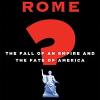Discussion Board
 |
Are We Rome?
by Cullen Murphy '74
Comparisons of modern America and ancient Rome have been a staple in American commentary, even when "modern" was the time of the Founders. But the motivations behind the comparison have varied over time. Two centuries ago, writers were interested in drawing lessons from the Roman Republic--useful and cautionary lessons. Could our own young republic stay a republic? Americans today have some of the same concerns, but the comparison that comes most forcefully to mind isn't with the Roman Republic--it's with the Roman Empire.
Modern America and ancient Rome are of course vastly different places in countless ways. But in my book Are We Rome? I look in depth at a number of similarities: the blinding, insular, arrogant culture of our capitals; the weakening of the body politic through various forms of "privatization"; the burgeoning corruption of government; the domestic dislocations caused by the growth of the national-security state; and the widespread popular ignorance of the larger world. I don't take a position on whether America is or isn't a true empire--but I do argue that these forces are undermining the health of our society in the same way that they undermined Rome's.
I encourage your thoughts and ideas on these topics presented in Are We Rome? and look forward to the conversation.
Best,
Cullen Murphy '74
Some questions to consider:
- American military power has often been compared with that of ancient Rome. Maintaining that power entails social costs. Does the United States have advantages that Rome didn't have? By the same token, does it have special handicaps too?
- The balance between power that is held privately and power that is held publicly is ever-shifting. Today more and more power seems to be moving into private hands of one kind or another. Is this a long-term problem, as I believe, or simply the way things must be done in the 21st-century world?
- Survey after survey confirms that Americans know very little about the outside world, and that their curiosity about it is modest. In Rome as in America, such lack of knowledge carries a price, in economics as in foreign affairs. Are there any signs that this situation is turning around, as most commentators believe it must if we are to compete in a global economy?
- The subject of "lessons of history" is a double-edged sword: it often seems that paying attention to the lessons of history--depending on how you interpret them--can lead down the wrong path as easily as the right one. What's the correct way of thinking about how history should be "used"? Or should it be used at all?
Post your thoughts on Are We Rome? by adding a comment below.
You will need to log in to view any comments already posted.